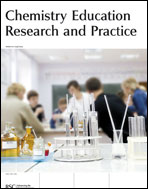Scientific norms and ethical misconduct: research towards the design of a course in scientific ethics
Abstract
We report our study of chemistry graduate students’ beliefs regarding the normative values of their disciplines and their perceptions of the ethical challenges they face as students, teachers, and scientific researchers. Using a phenomenographical lens, we interviewed seven graduate students who had achieved Ph.D. candidacy and at least 3 full years of experience in the program. Inductive, grounded-theory analysis of the data indicated that the students focused on plagiarism and data falsification when speaking of scientific misconduct, and tended to view normative values as the opposite of misconduct. None of the students appeared to understand clearly the process of establishing claims in science. Instead, they believed that it was the advisors’ roles to make final judgments regarding the validity of their data. Overall, the data indicate that the participants’ impoverished conceptions of scientific ethics resulted from naïve personal epistemologies of science, which, in turn, was partly due to their under-developed professional identities. We recommend that training in scientific norms and the nature of science should precede instruction involving case study analysis of misconduct or ambiguous scenarios.
- This article is part of the themed collection: Evidentially-Based Curriculum Development

 Please wait while we load your content...
Please wait while we load your content...